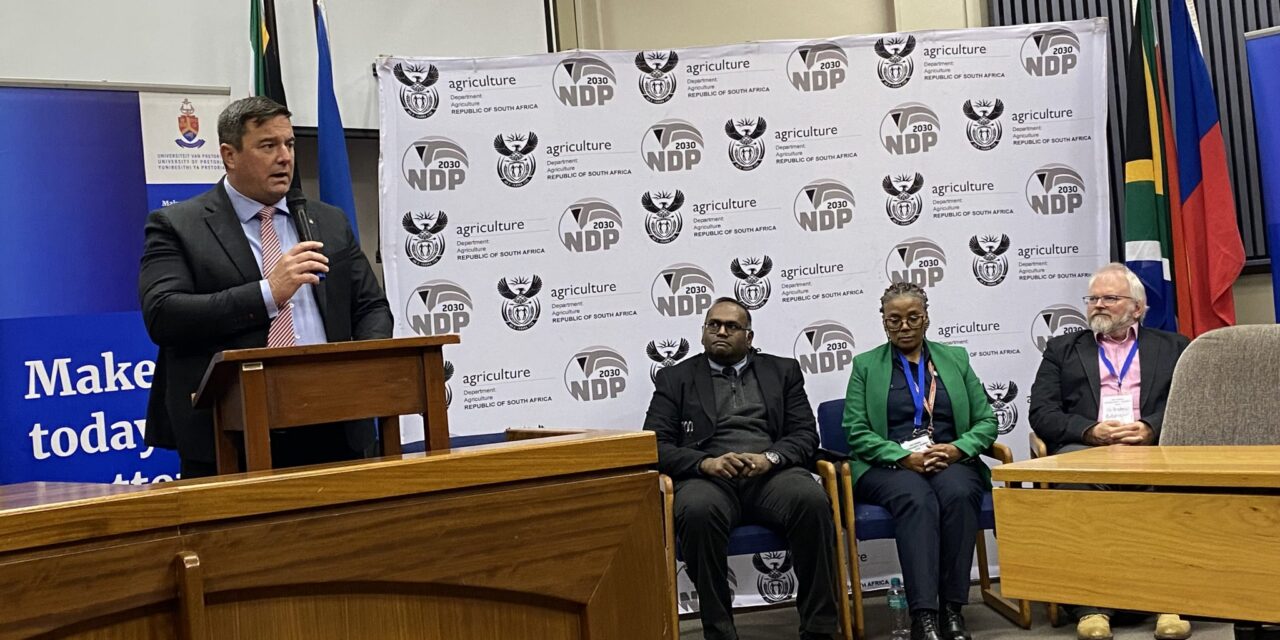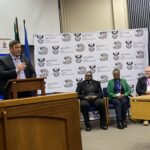PDBY was on the ground at the 2025 National Biosecurity Summit hosted from 10 to 11 June at the Sanlam Auditorium on Hatfield campus. Under the theme “Collaborative Actions for Food Security and Trade”, ministers, regulators, industry leaders, researchers, and students gathered to shape a five‑year national biosecurity strategy aimed at fortifying South Africa’s agricultural resilience.
Vice-Chancellor Prof. Francis Petersen opened the summit by welcoming delegates. His address was followed by an insightful keynote speech from Prof. Andrew Robinson of the University of Melbourne’s Centre of Excellence for Biosecurity Risk Analysis. Wandile Sihlobo of the Agricultural Business Chamber set the tone by highlighting the stark reality that over 60% of South African households face food insecurity, underscoring how trade, nutrition, and biosecurity are inextricably linked.
Minister of Agriculture John Steenhuisen delivered a candid address that struck a chord throughout the hall. Reflecting on recent outbreaks of avian influenza (better known as bird flu) and foot‑and‑mouth disease, he warned that reactive responses are no longer sufficient. “We need a new national biosecurity compact,” he declared, urging all sectors to assume joint ownership of solutions. In an exclusive interview with PDBY, he challenged aspiring scientists: “The first thing I ask students is [this]: please study Veterinary Sciences. We need as many vets in the country as possible. We are at a huge shortage. And if you are looking for a job, there is no shortage of jobs available in [the] veterinary sector. Biosecurity must be everyone’s responsibility. We need to be the eyes and ears of the department on the ground. Collaboration across science, technology, AI, machine learning, and engineering has huge applications in agriculture, and there is massive potential here to drive economic growth and tackle unemployment.”
The summit also put a spotlight on enforcement. Minister Steenhuisen revealed plans to pursue criminal charges against those who violate biosecurity regulations, from illegal animal movements to stock theft. He floated the idea of a dedicated Biosecurity Act with built‑in offence codes designed to empower law enforcement and the courts.
Behind the scenes, the Faculty of Veterinary Science at UP is gearing up to play a pivotal role. Faculty Dean Prof. Vinny Naidoo emphasised that the faculty’s mission extends beyond clinical practice. He said, “We train the next generation of vets and researchers, but we also develop diagnostic tests, surveillance tools, and vaccines. Clinical management is one side; molecular biology and the basic sciences are equally vital. Some of our top researchers have no veterinary background, yet their work in disease diagnostics is transforming our response capabilities.”
Prof. Naidoo also stressed the urgent need to retain graduates in rural and underserved areas, and to expand internship and training posts to close the yawning gap of 400 vets needed in the public sector.
Throughout the two days, delegates repeatedly returned to the National Biosecurity Hub that was launched in 2022 by the Department of Agriculture, the Department of Science and Innovation, and the university. Described as “a new way of thinking,” the hub will facilitate real‑time data exchanges, field diagnostics, and risk assessments, empowering decision‑makers to act early and decisively.
The summit’s most resonant message came down to shared responsibility. From asking students to report illegal animal movements to urging citizens to support traceability systems, organisers made it clear: safeguarding our food systems is everyone’s business. Minister Steenhuisen concluded, “A good plan violently executed today is better than a perfect plan executed next week. Let us go out and execute our biosecurity initiatives so that South Africa cannot just defend against risk, but win the world championship of agricultural innovation.”
With new legislative ideas, cutting‑edge diagnostics, and a renewed commitment to collaboration, the 2025 National Biosecurity Summit has set South Africa on a course to secure its fields, markets, and future.
Jason Visser and Datis du Preez
Originally published on the PDBY website: From Lab to Legislature: Preventing Foot-and-Mouth Disease










